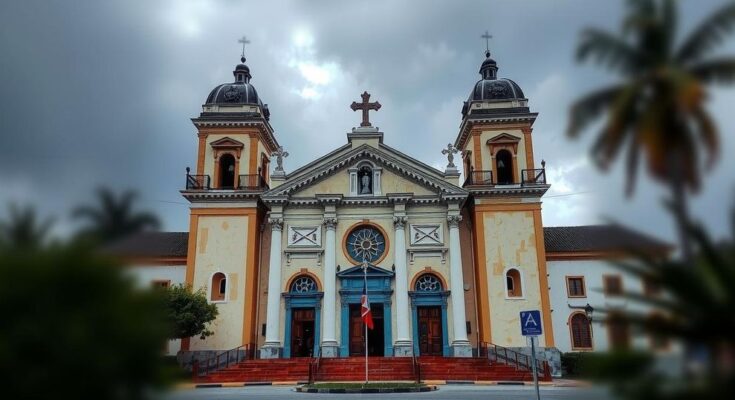The Nicaraguan government has intensified its crackdown on religious organizations by closing 1,500 nonprofits, including churches, citing financial report failures. New tax laws now require all religious entities to declare income and pay taxes, sparking accusations of efforts to “financially suffocate” the church. This crackdown has been met with widespread criticism as a means to suppress opposition against the Ortega regime.
In a recent escalation of its crackdown on religious organizations, the Nicaraguan government, led by President Daniel Ortega and Vice President Rosario Murillo, has shuttered hundreds of nonprofits, including various Christian churches and Catholic institutions. A decree issued on August 19 mandated the closure of 1,500 civic organizations due to their lack of recent financial reporting. This unprecedented action signifies a systematic effort by the Ortega administration to assert control over entities perceived as supporters of opposition movements. Among the institutions affected are notable Catholic organizations such as Caritas and the Madre del Divino Pastor congregation, which operate schools in Nicaragua. Following the government’s takeover, affected schools remain under the Ministry of Education, creating a climate of uncertainty for staff and students. Reports indicate that religious sisters managing these institutions are preparing to leave as government encroachments on their operations deepen. This recent crackdown coincides with ongoing limitations on civic organizations since 2018, with over 3,600 NGOs closed by the government. New tax legislation, effective August 22, now requires all religious entities to report their income and pay taxes of up to 30 percent. Critics, including church leaders and political analysts, have condemned this move as an attempt to “financially suffocate” religious organizations and repress dissenting voices within Nicaragua. Father José María Tojeira, a Jesuit spokesperson in El Salvador, remarked, “If priests were paid a salary, it would be normal for them to pay taxes. But that measure is really about the Sandinista regime trying to weaken the churches, to destroy them, and take control of them.” This sentiment is echoed by Eliseo Núñez, who described the government’s actions as a continuation of their dictatorial practices. He stated that the regime aims to implement a strategy of annihilation against the church. Furthermore, recent reports indicate that two priests have fled Nicaragua for exile in the Vatican amidst increasing government repression. Pope Francis has also expressed concern for the Nicaraguan people, urging them to maintain hope in difficult times.
The political landscape in Nicaragua under the Ortega administration has been marked by increasing restrictions on civil society and religious organizations, particularly those that offer support to opposition groups. This latest decree represents a broader trend of governmental repression against entities perceived to challenge the regime’s authority. The targeting of churches and nonprofits highlights the government’s attempt to stifle dissent and consolidate control over social and political discourse within the country. The historical context includes previous crackdowns on NGOs and civil society organizations after the civil unrest that began in 2018, which saw large protests against Ortega’s rule. The government’s actions have prompted widespread criticism from both local and international observers, raising concerns about the erosion of democratic freedoms in Nicaragua.
In summary, the Nicaraguan government’s recent efforts to close hundreds of nonprofit organizations, particularly religious entities, signal a stark escalation in their campaign to consolidate power and suppress dissent. The imposition of new taxes and income reporting requirements reflects a strategy aimed at weakening religious institutions that serve as bastions of opposition. Critics assert that these measures are part of a deliberate effort by the Ortega regime to eliminate any potential sources of resistance. Observers continue to call attention to the implications of these actions for democracy and human rights in Nicaragua, as the church and civic organizations face unprecedented pressures.
Original Source: cruxnow.com




